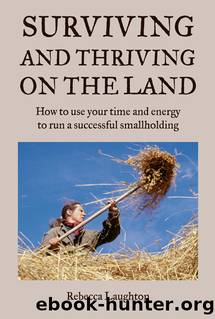Surviving and Thriving on the Land by Rebecca Laughton

Author:Rebecca Laughton
Language: eng
Format: epub
Publisher: UIT Cambridge Ltd.
For some people, however, there are a number of inherent weaknesses in collective ownership of land that no amount of communication and well-recorded agreements can overcome. Probably the most significant is that when you share land it is very difficult to gain a financial return on any improvements you might make to the land. This may not matter if you intend to stay in the community for the rest of your life. However, if you decide to leave for some reason, you may need capital to establish yourself in another situation, either to buy more land, for a deposit on a house or to set up a business. Some communities have provisions in place for giving people who are leaving a capital grant, as a form of âgolden handshakeâ, to thank them for the work they have put in. However, young communities rarely have the resources to do this, especially if they themselves are still repaying loans to secure their land. Another weakness of communal land ownership is that parents are less able to pass on property to their children, who may well not want to live in the community.
These sentiments were expressed by several people I spoke to. A young man, who had grown up in a community and returned to live there with his young family didnât want to stay there longer than five more years, despite enjoying the lifestyle it offered him. âWe want a bit of financial security. Many people will get parental inheritance. If I stay here I wonât get a chance to provide that for my children. But itâs hard because if we do move, our standard of living will drop. I donât really know what I want to do if I do move.â A woman who had recently left a community with her husband and young family to establish a farm of their own, gave their reasons for doing so as, âWe definitely wanted to build a house. We decided we wanted to own land so that work we did was there for our children (e.g. capital gain or ideally a farm)â. She went on to state later in the interview, that âwith communally owned land you donât benefit in the long run from work youâve put into the land because you donât own it.â
Some people attach less importance to personal ownership and inheritance, and view labour and capital investments as a gift to whatever land they may be living on at the time. However, whether or not individuals feel inclined to invest personal capital into long-term improvements of collectively owned land (for example, planting fruit trees or building a barn) usually relates closely to their sense of security about staying at the community and their trust in its long-term future. Living and together working harmoniously is a skill which will be considered in the next chapter.
Download
This site does not store any files on its server. We only index and link to content provided by other sites. Please contact the content providers to delete copyright contents if any and email us, we'll remove relevant links or contents immediately.
Craft Beer for the Homebrewer by Michael Agnew(18237)
Marijuana Grower's Handbook by Ed Rosenthal(3677)
Barkskins by Annie Proulx(3367)
Project Animal Farm: An Accidental Journey into the Secret World of Farming and the Truth About Our Food by Sonia Faruqi(3212)
Red Famine: Stalin's War on Ukraine by Anne Applebaum(2928)
The Plant Messiah by Carlos Magdalena(2927)
0041152001443424520 .pdf by Unknown(2843)
Organic Mushroom Farming and Mycoremediation by Tradd Cotter(2688)
In the Woods by Tana French(2587)
Beer is proof God loves us by Charles W. Bamforth(2453)
7-14 Days by Noah Waters(2409)
Between Two Fires by Christopher Buehlman(2316)
Borders by unknow(2303)
Reservoir 13 by Jon McGregor(2300)
Meathooked by Marta Zaraska(2256)
The Art of Making Gelato by Morgan Morano(2254)
Birds, Beasts and Relatives by Gerald Durrell(2217)
The 7 Habits of Highly Effective People: Powerful Lessons in Personal Change (25th Anniversary Edition) by Covey Stephen R(2189)
The Lean Farm Guide to Growing Vegetables: More In-Depth Lean Techniques for Efficient Organic Production by Ben Hartman(2135)
